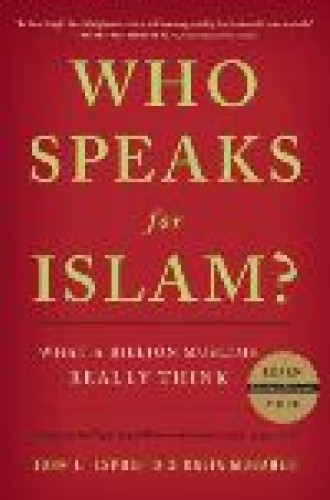Who Speaks for Islam? What a Billion Muslims Really Think
Is it ever justifiable to intentionally target innocent civilians in order to achieve political or military ends? Eighty, 81 and 86 percent of British, Canadian and American citizens say never. But only 46 percent of Iranians say never. A striking 24 percent of Iranians say attacks on civilians are often or sometimes justified, and 6 percent say such attacks are completely justified.
The previous sentences are lies, dangerous lies.
The fact that these lies nestle so easily into our presumed knowledge suggests why we need to reconsider what many of us think we know about Islam—and ourselves. This important new book is a great place to begin such a rethinking.
If Americans who aim to follow the way of Jesus are indeed interested in removing the planks from our own outlook before surgically removing the splinters from the perspectives of others, Who Speaks for Islam? provides a mirror to help us compare our crude stereotypes and rough-cut assumptions with a much more nuanced and surprising reality.
The truth is that the scary figures I attributed above to Iranians actually apply to Americans, and the more civilized figures I attributed to Americans, Canadians and British citizens apply to the people of Iran, Bangladesh and Pakistan. In contrast to the 6 percent of Americans who say attacks on civilians are completely justified, only 2 percent of Iranians and Lebanese would agree, and only 4 percent of Saudis.
Between 2001 and 2007, the Gallup organization launched the largest ever demographic research project involving Muslims. They conducted tens of thousands of one-hour in-person interviews in 35 predominantly or largely Muslim nations in Asia, Africa and the Middle East. Their sample represents more than 90 percent of the world’s Muslims.
Even two or three hours spent with the data will change forever the way readers consume so-called fair and balanced reporting, not to mention media punditry and presidential rhetoric, much of which the data show to be ignorant and stupid—dangerously so. Among the many findings that strike me as important, three stand out. First, when our president and others say that Muslim extremists “hate our freedom and our way of life,” they are patently wrong. Muslims of all stripes—moderates, extremists, women, men—actually respect our political freedom and many aspects of our way of life. They overwhelmingly want freedom of speech and the press, freedom to vote, and the technological advancement that characterize our way of life.
The dimensions of our way of life that they don’t respect—deteriorating families and a casual attitude toward sex—are exactly the same aspects many Americans aren’t proud of either.
Second, we have it wrong when we assume that Muslim women feel oppressed by Islam. They, like Muslim men, feel oppressed by corrupt dictatorships, and they see Islam as a force for justice and liberation in their lives. It would be fairer to say that Muslim women fear the oppression of non-Islam because with it, they believe, will come a Western-style breakdown in family life and the eroticization of their daughters and sisters.
Third, we don’t understand the role of shari‘a law in Muslim life. Earlier this year at a conference in Europe, Dalia Mogahed explained for me by analogy what Who Speaks for Islam? makes clear through research. Why, she asked me, did the writers of our Declaration of Independence refer to the Creator as the source of our inalienable rights? I replied that they probably did so in order to legitimize their revolution by using the same terms the monarchy used to legitimize its own authority: the rights of individuals come from the same God believed to grant divine right to kings.
In the same way, she explained, shari‘a represents to many Muslims a kind of declaration of independence, affirming that God wants to bring justice to all people and that God’s justice is higher than the distorted and haphazard tyranny of modern dictators. However repressive shari‘a might appear to Westerners, it is actually a major step up for many Muslims who suffer under systems with corrupt dictators in the capital city and crooked police officers in the neighborhood.
Mogahed was quick to add that shari‘a law isn’t as repressive in all respects as many non-Muslims may think. For example, since the seventh century, Muslim law has allowed women to inherit property—a right that wasn’t permitted in the West until the modern era. True, a firstborn daughter receives only a third of her father’s inheritance, while a firstborn son receives two-thirds, but the son has the obligation to support others with his wealth, while the daughter is expected to keep the money for her own use.
Reading books about other religions never substitutes for meeting and becoming friends with real people who adhere to those faiths. But perhaps readers of Who Speaks for Islam? will overcome some fears and prejudices so the next time they meet a Muslim neighbor at the office or in the classroom or in the parking lot, they’ll feel confident enough to start a conversation and invite their acquaintance over for tea. Reading books and brewing tea may not seem like peacemaking initiatives, but in a world like ours that is full of misinformation, they are.





